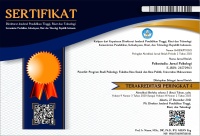Kontribusi Work Life Balance Terhadap Work Engagement Karyawan
Abstract
Penelitian ini bertujuan untuk mengetahui pengaruh work life balance terhadap work engagement karyawan. Work engagement sebagai kondisi mental yang positif, memuaskan dan berhubungan dengan pekerjaan yang memiliki karakteristik vigor, dedication dan absorption. Penelitian ini menggunakan metode penelitian kuantitatif. Subjek dalam penelitian ini sebanyak 103 yang berasal dari karyawan Politeknik X Yogyakarta. Pengumpulan data menggunakan skala work life balance dan work engagement. Analisis data penelitian menggunakan regresi linear sederhana. Hasil penelitian ini menunjukkan bahwa ada pengaruh positif work life balance terhadap work engagement dengan nilai korelasi Pearson 0,646 (p < 0,01). Sumbangan efektif dari work life balance untuk memprediksi work engagement sebesar 41,2 % dan sisanya 58,2 % dipengaruhi oleh faktor lain yang tidak diteliti dalam penelitian ini. Dengan demikian dapat disimpulkan bahwa hipotesis dalam penelitian ini diterima.
This study aimed to find out the effect of work life balance on work engagement. Work engagement as a mental condition that is positive, satisfying and associated with a job that has characteristics of vigor, dedication and absorption. This research method is quantitative. The subjects in this study were 103 Polytechnic X Yogyakarta employees. The data were obtained using the scales of work life balance and work engagement. The data analysis method in this study used simple linear regression. The results of this study there is a positive effect of work life balance on work engagement with a Pearson correlation value of 0.646 (p <0.01). The effective contribution of work life balance to predict work engagement is 41,2 % and the remaining 58,2 % is influenced by other factors not examined in this study. Thus it can be concluded that the hypotheses in this study are accepted.
Keywords
Full Text:
PDFReferences
Agusta, R., & Sahrah, A. (2020). Pengaruh Sistem Reward Terhadap Work Engagement di PT. X dengan Keadilan Prosedural Sebagai Variabel Kontrol. Jurnal Psikostudia, 134-142.
Albrecht, S. L. (2010). Handbook of Employee Engagement: Perspective, Issues, Research and Practice. Massachusetts: Edward Elgar Publishing.
Alzyoud, A. A. (2018). Job Satisfaction and Work Engagement Moderated By Trust. International Journal of Economics, Commerce and Management, 125-139.
Azwar, S. (2009). Penyusunan Skala Psikologi. Yogyakarta: Pustaka Pelajar.
Bakker, A. B. (2011). An Evidence-Based Model of Work Engagement. Current Directions in Psychological Science, 265-269.
Jaharuddin, N. S., & Zainol, L. N. (2019). The Impact of Work Life Balance on Job Engagement and Turnover Intention. The South East Asian Journal of Management, 106-118.
Kementerian Perindustrian. (2018, September 15). Kemenperin. Dipetik November 03, 2019, dari https://kemenperin.go.id/artikel/19676/Revolusi-Industri-4.0-Buka-Peluang-Dongkrak-%E2%80%98Skill%E2%80%99-SDM
Larasati, D. P., & Hasanati, N. (2018). The Effects of Work Life Balance Towards Employee Engagement in Millennial Generation. Advances in Social Science, Education and Humanities Research (ASSEHR), 390-394.
Lockwood, N. R. (2007). Leveraging Employee Engagement for Competitive Advantage: HR's Strategic Role. Alexandria: Society For Human Resource Management (SHRM).
Macey, W. H., & Schneider, B. (2008). The Meaning of Employee Engagement. Industrial and Organizational Psychology, 3-30.
Ningsih, N. O., Musadieq, M. A., & Utami, H. N. (2015). Peran Serikat Pekerja dan Manajemen Dalam Membina Hubungan Industrial (Studi pada PG. Kebon Agung Malang). Jurnal Administrasi Bisnis (JAB), 1-10.
Parkes, L. P., & Langford, P. H. (2008). Work Life Balance or Work Life Alignment?A Test of The Importance of Work Life Balance For Employee Engagement and Intention to Stay in Organisations. Journal of Management & Organization, 267-284.
Priyatno, D. (2010). Teknik Mudah dan Cepat Melakukan Analisis Data Penelitian Dengan SPSS. Yogyakarta: Gava Media.
Rohida, L. (2018). Pengaruh Era Revolusi Industri 4.0 Terhadap Kompetensi Sumber Daya Manusia. Jurna Manajemen Bisnis Indonesia, 114-136.
Schaufeli, W. B., & Bakker, A. B. (2004). Job Demands, Job Resources, and Their Relationship With Burnout and Engagement: A Multi-Sample Study. Journal of Organizational Behavior, 293-315.
Schaufeli, W. B., Salanova, M., Gonzalez-Roma, V., & Bakker, A. B. (2002). The Measurement of Engagement and Burnout: A Two Sample Confirmatory Factor Analytic Approach. Journal of Happiness Studies, 71-92.
Sudarmanto, S. I. (2009). Kinerja dan Pengembangan Kompetensi SDM: Teori, Dimensi Pengukuran dan Implementasi Dalam Organisasi. Yogyakarta: Pustaka Pelajar.
Sugiyono. (2010). Metode Penelitian Pendidikan Pendekatan Kuantitatif, Kualitatif dan R&D. Bandung: Alfabeta.
DOI: http://dx.doi.org/10.30872/psikostudia.v10i3.5627
Refbacks
- There are currently no refbacks.
Copyright (c) 2021 Psikostudia : Jurnal Psikologi

This work is licensed under a Creative Commons Attribution-ShareAlike 4.0 International License.
Indexing by :
_________________________________________
PSIKOSTUDIA: Jurnal Psikologi Published by Faculty of Social and Political Siences, University of Mulawarman, Samarinda, East Kalimantan and This work is licensed under a Creative Commons Attribution-ShareAlike 4.0 International License.
_________________________________________
PSIKOSTUDIA: Jurnal Psikologi
Department of Psychology
Faculty of Social and Political Siences, University of Mulawarman
Jl. Muara Muntai Kampus Gn. Kelua Samarinda 75411
Phone: +62 813 35350368
E-Mail: psikostudia@fisip.unmul.ac.id




















